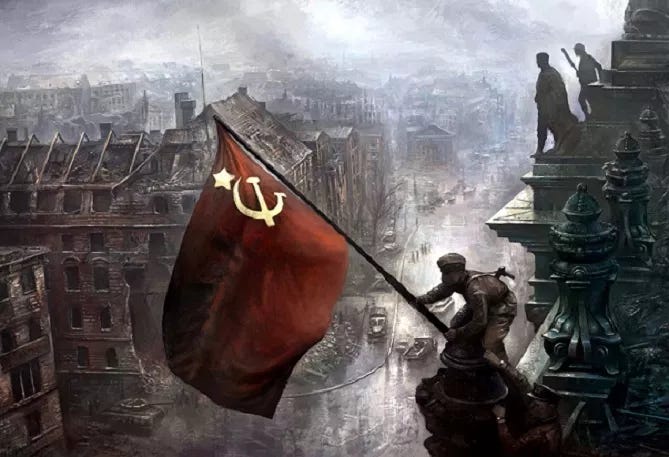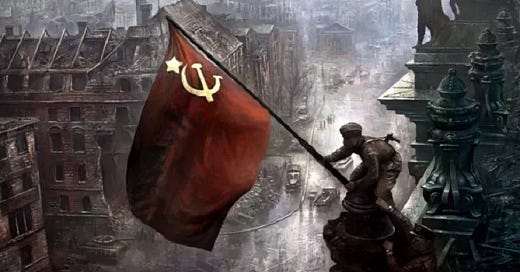2 | THE BONDSMAN'S PRAYER : Nietzsche, Marx & the Economy of Agency
Method & Madness | Book III : The Masters' Game

It is clear why in the colonial countries the peasants are revolutionary, for they have everything to gain and nothing to lose. The starving peasant is the first among the exploited to discover that only violence pays. For him there is no compromise, no possible coming to terms; it is only just a question of relative Power.
—F. Fanon
The Power of Kings cannot be seized—instead, only acknowledged. It cannot be taken—instead, only given by those who choose to serve. A Master is, after all, but one man alone; and thus-alone could only ever hope to achieve what one man could.
A Master’s might has never been an Absolute Power—instead, it’s only ever been… simply a Social one.
Agency is:
The Power to act upon the world and change it by our will.1
Agency is thus, in effect, lifespan: the totality of a person’s time-and-energy which may be spent upon this world.
Agency is required for Labor to be done.
When Labor is done, it creates Value.Thus is Value an expression of Agency: a piece of lifespan expended through work to create things-considered-valuable.Agency is Value—because it is-Valued—because it can be transformed into Labor:
Work that is done.
Value is created when Agency is expended.
We—human beings—trade our Labor and lifetimes to create or obtain Resources. In this way, we transform our Agency into Capital: the precipitate of human lifeforce… stored as things-of-Value.2
Economics is, at its core, the scientific study of human behavior—the behavior, however, not of human individuals… but instead of human societies. The study of the movement and distribution of Value:
The Economy of Agency.3

This is goal of the Masters’ Game:
To secure Resources to ensure Survival (and, thereafter, to promote Prosperity).
Thus can it be said that the goal of the Game is to aggregate Value—to secure access to productive Labor, and therefore to collectivize Agency.
And so, the goal of the Masters’ Game is to concentrate Labor—to build Civilization. To acquire the Power to direct the collective Agency of Others toward a unified vision, thus-becoming better able to amplify the Social potential for Value-creation. Through Civil Labor is great Value made… and only through a collective Agency may the Master’s walls and wonders be raised.4
Thus, the Master must first gather people—be they friends, vassals, hirelings, or slaves—if he hopes to accomplish anything at all. He must collect Workmen to be the Master-of, convincing them—one way or another—to labor together under his authority. Via either (or both):
Contraction5: an Assimilative promise of reward—to Civilize and provide positive-Value in exchange for productive and dedicated Labor.
Subjugation: an Annihilative threat of punishment—to Rivalize and induce negative-Value in exchange for insufficient or negligent Labor.
The Master seeks Workmen who will expend their Labor to increase the breadth of his Agency; to amplify his Power to better-ensure the Survival of the Civil world. The Workman is therefore, in turn, a Subject whose Agency is pledged or seized—taken-to-serve as an Object-of-Value in order to enact a Master’s will and shape the world to his vision. The Workman is thus Objectified6—taken for use as a tool. Assessed and possessed for his Value as an Object—the Utility of his Power to generate Capital in service toward a Master’s ends.
The Civil & Rival7 is thus manifest as an axis of Objectification:
The Value assigned to a given person in the world of Social-Objectivity.8

In reality, the most pressing human concern isn’t with one’s destined eventuality—i.e. our Agency isn’t primarily directed toward questions of Absolute-Objectivity. Instead, our most pressing concern is typically with one’s personal, current situation—the Individual-Subject’s fundamental entanglement with questions of Social-Objectivity.9 After all, our Agency isn’t something which we can rationally consider to be permitted (or denied) by gods or fate—i.e. metaphysical Absolutes.10 Instead, it’s a freedom that we can empirically observe is constrained and defined by the Agency of Others; by Man and Masters and Other people, and by truths fixed in a Social reality.11
In the Masters’ Game, there are two ways to win: Assimilation or Annihilation. This is the Adept’s Gambit—and, a failure to push a Gambit to completion inevitably yields Subjugation:
A failed attempt to establish Dominion—and thus, to enslave the Rival instead.
Subjugation is failure; the result of attempts to enact hybrid strategy, combining both Gambits into one—that is, to attempt to simultaneously Assimilate and Annihilate a unitary Rival people.12 It is, in effect, a strategy which aims to make Rivalized Labor produce Civil Value: to convert the Agency of an Other-population into a Resource which benefits the Civil world.
Assimilation is slow—Annihilation is waste. Thus is Subjugation fundamentally driven by economic incentive. Why waste the Agency of a Rival, after all… when you could harness it instead?
For the individual slaver, bondage may appear at first to pay well. Cheap or free Labor means that, in theory, the difference in Value-created may be pocketed as simple profit. In practice, however—that is, in reality—slavery is neither cheap nor free. The cost of Subjugation is well-hidden—not evident in the price of a Bondsman’s acquisition, nor indexed in a line on a balance sheet. Instead, this difference in Value-created is carved out from overall worker productivity.13
The human being is not a machine—he doesn’t want to be a slave. From the time that he’s born, every Man upon this Earth dreams of the day he’ll be free—finally the Master of his own fate. When he is discontented, his quality-of-Labor declines. When he is unhappy, he produces poor Value. When he feels the crushing weight of bondage pushing down upon him, he will push back in rebellion, attempting to seek and exploit gaps in what he believes is an unfair system. He will work only as hard as he must—the rest of his time, he’ll spend trying instead to break free.
Subjugation foments rebellion. Contraction creates allegiance.
Freedmen who are clean, clothed, well-fed, and have a place to sleep at night… will be happy and loyal to whoever Contracts them to produce such great reward—to their Good and Civil-Master, who deserves their praise and admiration. Thus do they follow him willingly, dedicating their Agency to his works—that is, for so long as they continue to believe that he makes their lives Good.
Bondsmen who have nothing, and are forced to live in their own piss and shit… will make piss and shit, and pledge that to their Rival-Master. If pushed to ply their Labor to produce greater Value, they will get angry instead—after all, they are returned no Value, and instead face punishment if they fail to comply. They will curse their Subjugator, branding him Evil—after all, they’re forced to expend their lives in the service of someone who makes their lives Bad.
The Workman, if instead Contracted, will work hard and work well. Freedmen allowed to ply their Labor and collect fair Value in exchange for Agency—allowed to serve their own self-interests and choose their project-of-Labor—will produce Value proportional to their own level of passion and commitment. With no incentive to waste their Agency struggling to break free, the Contracted Workman is Civilized (i.e. not Rivalized), and is thus simply free to participate equally in a Civil economy.
Able to own his own wealth—to accumulate a personal store of Capital14—this Freedman can now, if he so-chooses, aspire to become his own middle-Master. He remains for now in the Master’s employ—however is, in a sense, also a Master in his own right; a person who maintains his own Civil world (though perhaps, at a smaller scale). And, given time and enough Value-gathered, he may eventually grow to become truly his own Master—freed from employment, and thus unbeholden to any higher Power to guarantee his Survival.
Slavery is Bad for the economy.
Subjugation is a Nihilistic incentive-system built upon the theory that the best way to make people productive is to force them to Labor through threat of punishment. It was Schopenhauer who, after all, believed that Man’s existence is primarily motivated by the Will-to-Life—that is, the instinct to persist, conserve, and prolong one’s own pitiful, meaningless existence. Nietzsche, however, paints us a more faithful picture of reality—that is, that Man is not primarily driven by the Will-to-Life, but instead first-motivated by the Will-to-Power:
The desire to expend one’s finite existence in the most meaningful way possible.15
Human beings are not best-motivated when they’re Subjugated under threat of punishment. They are, instead, best-motivated when Contracted—when promised reward.
To achieve a stable and lasting state of Survival & Prosperity, the Master must be both willing and able to build his own world.16 He must possess the Power and conviction necessary to achieve Dominion, as well as the discernment necessary to only choose Annihilation when there is no recourse. Within the realm of the Civil, after all, there can be no Subjugation (i.e. Rivalization)—at least, not without introducing a debilitating systemic inefficiency. For incentives to be well-aligned, all people must be provided a fair opportunity to become Civil—that is, to become citizen-stakeholders in the collective project of Civil-society. The Master must guarantee that his people feel Civil—that their Labor feels Valued, their Agency feels protected, and their Survival feels ensured. The Master must guarantee that Civil people believe that they’re his people. To fail in this is to court disaster, for if his people begin to feel that they’ve become Rivalized—to believe themselves no longer Contracted, but now Subjugated instead—then they’ll start to act like Bondsmen do. Brick-by-brick, they’ll begin to pick apart the Master’s Dominion; siphoning off Civil Resources to stockpile their own Value instead, preparing for the day when they’ll be Civil-no-longer, and must act as the guarantors of their own Survival instead.
Book I, Section 5: Being & Nothingness.
As in Marx, wherein Labor is transformed into commodities. In Marx, commodities possess differential use-value (i.e. personal utility) and exchange-value (i.e. market price). While it’s true that price is simply a representation—and therefore an abstraction—of utility, it is already the case that Value is derived from Agency, and therefore technically abstract because Value is a function of Individual-Subjectivity (e.g. Book I, Section 4: NIHILI⬥ CARMEN: “Truth is knowledge that we create, and meaning is Value that we assign.”).
Capital is made through the Will-to-Power—i.e. Value is created through Labor, which is itself the exercise of Agency.
Book II, Section 5: Pragmatism.
In the historical sense—as in “to draw up a contract”—and/or the etymological sense: as in, “to draw-together”. To negotiate an agreement for co-operation in exchange for mutual benefit.
i.e. Commodified, or transformed into human-Capital. In the Nietzsche, he is called Slave—in Beauvoir, she is called Wife.
Book II, Section 9: The Dialectical Cube.
i.e. the imagination which represents us in the minds of Other people.
It can thus be argued that addressing questions of Absolute-Objectivity can manifest as a given individual’s most-pressing-concern when he perceives them as imminent problems of Social-Objectivity.
Book I, Section 3: Method & Madness.
As in Fanon—and broadly, in Black Existentialism—where it’s said that the fixation on discovering one’s place in the universe (i.e. the “Absolute purpose” of one’s existence) is the Freedman’s privilege. For the Bondsman, there is no time or space to seek answers to questions of grand purpose—after all, one’s place is already assigned. For the Bondsman the question is imminently Social, for there is no reason why he would spare time to wonder whether or not he’s theoretically oppressed by God… when he knows empirically that he’s oppressed by Man.
Hybrid strategy results in simple and obvious failure—after all, you cannot expect to be able to Civilize a people whom you’ve already Rivalized; that is, to Assimilate a people (at least, who remember) when you’ve already tried to Annihilate them.
Subjugation is unsustainable—a stopgap measure, and thus by definition not a resolution. Bondsmen are, by definition, prisoners (that is, employed against their will); to contain them and force them to work imposes risks, costs, and constant upkeep. Thus will Subjugation eventually resolve in the end in one or the other direction: toward either Assimilation or Annihilation.
i.e. to aggregate his own Value-reserve, increasing the scope of his own personal Agency.
Man does not desire to prolong his own existence—to achieve immortality—so that he may persist infinitely within an empty void. The Will-to-Life is thus nothing but a simple aspect of the Will-to-Power; the desire not to seek longevity in-and-for-itself… but instead, the desire to hold more Power—more Agency—within one’s grasp. Man desires to extend his existence because he wants more time—time expend to do the things which he loves and wants to do.
i.e. to found Civilization.














